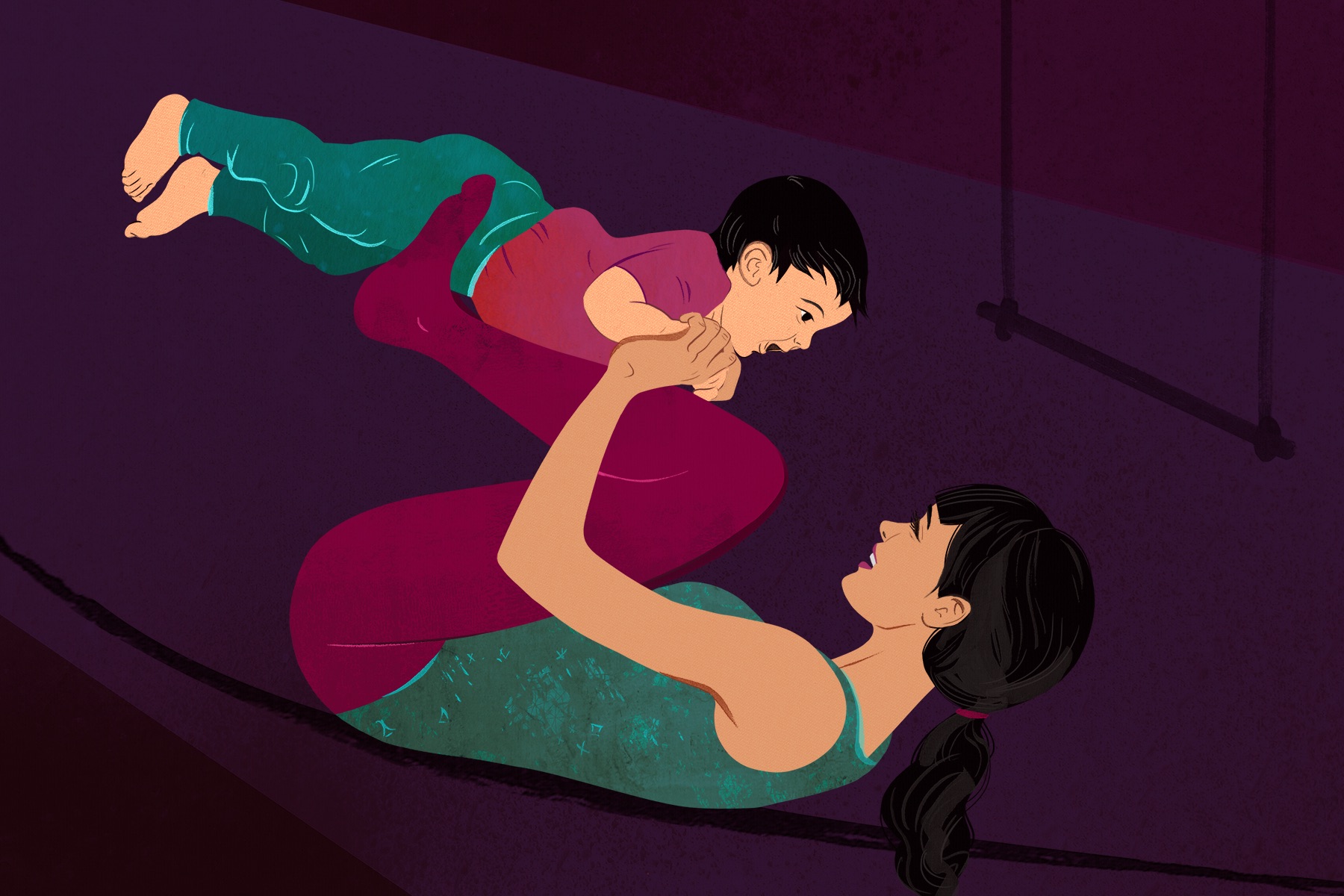Performing and Parenting: Michelle Monteith
For actors, financial stability is often a concern. Did finances factor into your decision to have a baby, or the timing of your pregnancy?
Well, when I was pregnant, Stu knew what he was working on, so we knew we would be okay, we just had to be cautious.
But also, I thought of this story—it was my second play back after having a baby, and there were some patrons attending the first reading. A woman came into the bathroom as I was washing my hands and she said, “My goodness, do you ever see your child?” And I was so shocked I didn’t know what to say, and I immediately felt defensive. I can’t even really remember what I said to her but in hindsight I wished I’d said, “I actually have to work. I’m very lucky, and I love my work, but I also have to work, because of what we do, you work when you can.” So I wished I had let her know that this isn’t just a little… ego party that I’m having.
Wow. No, you’re doing your work and supporting your family.
I would sometimes hear people say, “You know, I want to be home, this time is such a special time,” and of course it is, but I think people forget that sometimes people have to work because they’re not necessarily in a financial position not to work, and just that inherent judgment… it’s so funny. Even among people you don’t expect it from. Someone said to me, and I think it makes sense: If someone does what you didn’t do, it makes people feel like their decision was wrong. If you didn’t stay home for a year, and someone else did… People judge choices if it wasn’t the choice they made. We’re hard on each other.
I remember a colleague was feeling that she was working a lot, but she had to work. She had to. And I said to her, “If we worked in a factory, putting bottle caps on bottles, we wouldn’t feel guilty because we’d know we’d be doing what we had to do to bring money home, but because we love what we do, it has an air of, ‘Are we being selfish?’”
I’ve always thought that children benefit from seeing their parents thrive and doing what they want in life, because they see that and it’s infectious. And our work is so enriching. You learn about so many different things in the world. The trick is always finding a balance.
Do you think Stuart has ever been asked questions like that about being a parent, and work/life balance?
Nooooooo. Not that he doesn’t sometimes question it himself, but I don’t think other people question him like that.
It seems like the two of you have been able to trade off contracts quite often, where one of you works while the other doesn’t. Has that been planning or fortune?
Maybe only 40 percent of the time Stu and I have been in shows at the same time, and that’s been fortune more than planning. I don’t think either one of us would stand in the other’s way if there was an exciting opportunity. He was working in Ottawa last January, and I was working here, and we knew it would be a lot, but it was a project he really wanted to do, with people he really wanted to work with, so it was a no-brainer. There’s always a discussion, because every decision we make affects more than just ourselves, so there’s always a talk, but always in a supportive way.
You performed Butcher in Calgary earlier last year before bringing it to the Theatre Centre in Toronto, right?
Yes, and my daughter came with me. It was an opportunity I didn’t want to miss, working with Weyni [Mengesha] and Nicolas [Billon], and my mum lives in Vancouver and came to Calgary to help, which is what made it possible because otherwise the childcare would have been impossible. Stuart was able to come out for a week but he was also working at the time. I haven’t considered travelling without her yet, which might be possible in a little while. I’ve travelled with her twice now. It’s a little harder as she gets older so it would have to be a really interesting project for me to work out of town. And the time of year matters too.
You and Stuart sound like a really great team. When you’re both on contract, what does childcare look like?
I’ve always tried to hire someone who’s available during the whole contract, so that there’s consistency. It doesn’t always work that way, but fortunately we’ve had amazing babysitters and my daughter has loved them all. She likes having a few different people, actually. The hardest thing is that you rarely get your schedule in advance. I always try to find out what they’re intending the days to look like, but that can be harder to know at a repertory theatre where some actors in a cast may be rehearsing only five hours due to a rep schedule, but that doesn’t mean you won’t be doing longer hours. So that requires flexibility on everyone’s part. Most of the babysitters we’ve hired have been involved in theatre in some way, so they get it.
She’s in preschool now, three days a week, so that helps. Putting her in daycare didn’t make sense for us because it would be great for rehearsal but then we would need someone once we switched to nights. Sometimes childcare is really expensive—I remember during the tech period for Angels in America, it was a particularly long tech, lots of twelve-hour days, and I was signing over the whole paycheque. That was hard.
Let’s talk about the work. You’ve said, maybe half-jokingly, that coming to work can feel like a rest after parenting.
It’s totally different. At work, although you’re trying to take in many things, there’s a singular focus. Whereas entertaining a child, and running around, and keeping up with them, I feel more scattered. There’s something concentrated about coming to work. Even if it’s on difficult material, it feels calming.
Has becoming a mother changed the art for you?
Well, I hope that… it’s tricky because I don’t mean to suggest… I just feel that it’s widened my view. And I don’t mean to suggest that someone who doesn’t have a child, that one’s view can’t be widened in different ways, but for me it has given me stronger and more direct channels to my feelings. That’s not to say that there’s not all that other anxiety and stuff, but it helps lock things into perspective in a different way.
I imagine you have some significant time constraints at home. Has your preparation changed?
Depending on the project, prep has to happen at home. But it has probably increased the value of my time in the rehearsal, how I work, because I know the vast majority of my work is done in the rehearsal hall. I don’t work very well at night, after she’s gone to bed, I’m just too tired. Morning is the best time, but morning isn’t a great time at home, there’s just too much going on… Certainly, if work has to be done at home, I can say to Stuart, “I really need to get this done,” and he’ll go off or give me time to go off, and vice versa.
And now, I can bring her to voiceover auditions with me. I bring her to voice ones because you get the short script, and you generally don’t need a lot of time or a huge amount of concentration. She just sits with me, and she loves it because she gets a little treat, to watch something on my iPad, which she doesn’t usually get to do. So she sits there and I say, “Mummy’s going in now,” and I’m gone three to four minutes. I love it because she likes it too, and it also feels like, “Yeah, we can do this.”
That’s such a great example of making it work. Are there other ways that you think the industry, and theatres, could be supporting parents?
I would be a big proponent of the five-day workweek. Even five and a half. When we were with Weyni on Butcher we had Sundays off, and half of Monday, and that was actually perfect because you had a full day off when your kid wouldn’t be in school or something, but we also had half of Monday to do banking, or dentist appointments, stuff you can’t do on Sundays.
Yeah, why do we do six-day weeks?! Anything else spring to mind?
Only the dream of having childcare at the theatre. That would be amazing.
Any last words you want to share, maybe your plans for the future—are you a planner?
Not really! I mean, it’s one of the things I love most, even as we’re sitting here, neither of us knows what this time next year could look like, and I love that because something great could be right around the corner.
This has been so great, Michelle, thank you so much.
One more thing: When I was in university, Nicola Cavendish come and gave a talk to our school, and I remember her saying, “People will tell you you can’t do it, it’s crazy to have a family and be the theatre.” But she also said, “If you want it to happen, you will find a way to make it work.” I never forgot that. If there’s something that you want, no matter what it is, you find a way to make that work. I think that’s something that’s good to remember.










Comments